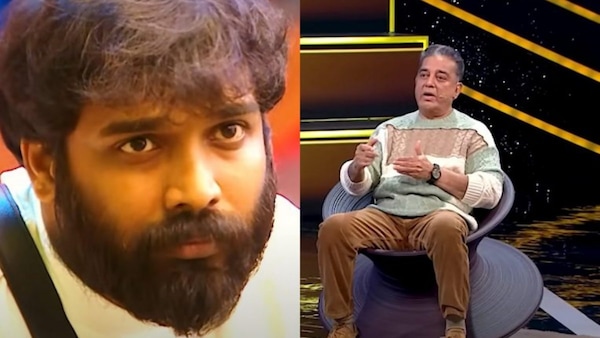Bigg Boss Tamil 7's #MeToo moment and how Kamal Haasan handled the case of Pradeep Antony
Former Bigg Boss Tamil 7 contestant Pradeep Antony's eviction is complex and a closer examination will reveal certain key elements that drove #MeToo movement.

Last Updated: 04.37 PM, Nov 06, 2023
Last Saturday's episode of Bigg Boss Tamil season 7 was high on theatricality as it unspooled like a gripping courtroom drama with the show's host Kamal Haasan playing the judge. The case was Housemates versus Pradeep Antony, highlighting concerns about women's safety within the show
Pradeep Antony is a well-known actor. From the outset, he portrayed himself as a "master strategist" with a clear path to the finals. As he gained importance within the house, his competitive spirit and belief in his strategy made him a formidable contender. As he also survived every elimination round, it might have given him enough confidence that his efforts resonated with the viewers.
We can all agree that Pradeep was a strong competitor, and very committed to his act on the show. Probably, he thought winning this game show was the ticket to his first big success. His competitiveness exposed his aggressive side, giving his fellow competitors enough reasons to point out flaws in his behaviour.
His actions often seemed self-incriminating and his time on the show was abruptly cut short due to a series of brash behaviors.
The echoes of #MeToo
Pradeep's case is complex and a closer examination will reveal certain key elements that drove #MeToo movement.
First things, first. There were no allegations of sexual misconduct against Pradeep. Most women and some men in the house accused Pradeep of issuing physical threats that kept them on the edge. Pradeep was prone to emotional outbursts and contestants claimed that they were always cautious about not attracting his ire.
You may wonder what's the connection between Pradeep's case and #MeToo movement. The connection lies in how other housemates reacted to the allegations against him.
Whether Pradeep's methods were right or wrong is a different debate. But, certain arguments reminiscent of attempts to discredit women speaking out in #MeToo emerged.
Take, for example, contestant Vichithra who played the Devil's advocate, questioning the girls who led the protests against Pradeep's behavior and whether they had set clear boundaries with him. Vichithra's arguments echoed outdated ideas often seen during the #MeToo movement, such as blaming victims for not speaking out sooner.
"If you had spoken out against Pradeep's actions sooner, this wouldn't have gotten so far," argued Vichithra with other housemates.
"You seemed friendly with him all this while, now you are making these allegations out of nowhere?" This is an approximation of some of Vichithra's arguments.
Vichithra also made false comparisons, suggesting that the complainants' actions were contradictory to their allegations. "If she was so concerned about her personal safety, she should not have come to this show in the first place. She claims to be traditional but she is always talking to the boy till late in the night. I don't understand this culture. It's not acceptable for me. If that was the case, why didn't she oppose him (Pradeep) then only? I don't know whether she gave him the liberty to speak to her like that," Vichithra said while reflecting on Saturday's events.
These arguments parallel those heard during the height of the #MeToo movement, highlighting the need for progress in societal thinking.
Vichithra failed to grasp that consensual interactions between adults are not a crime, and the issue arises when consent is absent.
"Did you give him clear warnings?" is another popular argument. The responsibility should be shared, and Pradeep's actions should have considered the comfort and safety of others.
Vichithra's arguments are soaked in problematic views. For starters, not everyone will be able to understand what's happening to them at the very onset. Questions like "When I could see the problem, why didn't you?" are not valid. Some people might take their own time to make sense of all the emotions and address them in the right context. Is this matter insignificant? Am I overreacting? Or I am the only one who's feeling like this? Many questions must be resolved before one can develop enough courage and strength to voice these feelings in a public setting.
So Vichithra's time of reaction may be different from another person's. There is no general thumb of rule or statute of limitations dictating when one can express their feelings.
The eviction of Pradeep Antony
Kamal Haasan conducted a quasi-court proceeding turning all housemates, barring Pradeep into juriers. He asked each how they felt about the matter and whether or not Pradeep's behaviour warranted eviction, symbolized by the red card. The majority felt that he needed to be shown the door. And Kamal unceremoniously asked Pradeep to leave the show.
Following Pradeep's eviction, the internet was divided. Many seemed to believe that the girls ganged up against Pradeep, fabricated false allegations, overstated the level of threat and forced the showrunners to throw him out.
Now, as it was established already, the allegations against Pradeep were not sexual. It seemed the less aggressive housemates, deemed him as a tyrant who was getting out of control. And all his actions were caught on camera, probably providing enough ground for the showrunners and Kamal to take such a strong action.
Pradeep also seemed he didn't have a strong defence for himself. He fell short of words to explain the rationale behind his actions. It seems Pradeep's short temper got the better of him and when he was called to account, he couldn't offer a justifiable defense.
Unlike what he had led everyone to believe, Pradeep's game plan was far from foolproof. He was driven by his emotions, didn't behave responsibly, crossed a few lines and paid the price for it.
The end doesn't always justify the means.

